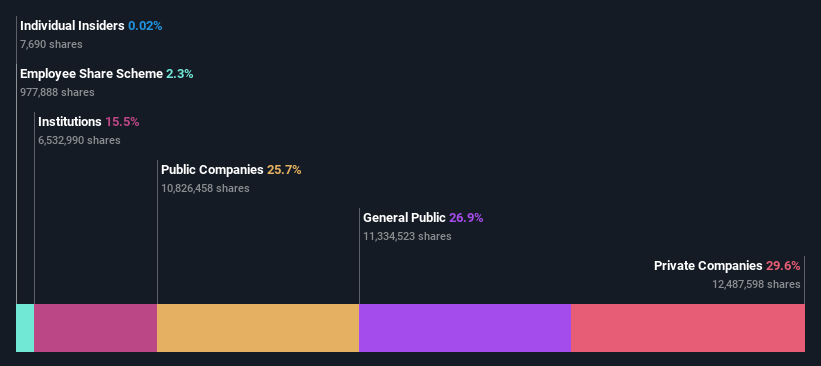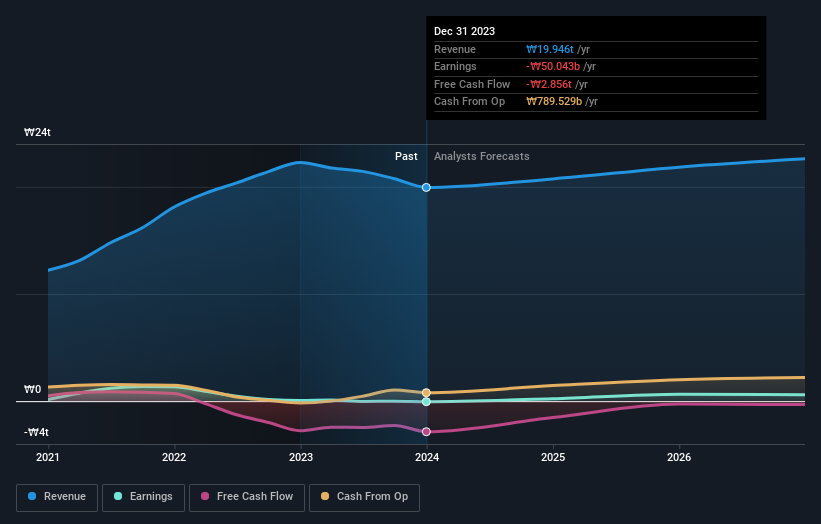Stock Analysis
- South Korea
- /
- Chemicals
- /
- KOSE:A011170
Individual investors own 27% of Lotte Chemical Corporation (KRX:011170) shares but private companies control 30% of the company

Key Insights
- Significant control over Lotte Chemical by private companies implies that the general public has more power to influence management and governance-related decisions
- A total of 2 investors have a majority stake in the company with 55% ownership
- Institutions own 15% of Lotte Chemical
If you want to know who really controls Lotte Chemical Corporation (KRX:011170), then you'll have to look at the makeup of its share registry. The group holding the most number of shares in the company, around 30% to be precise, is private companies. Put another way, the group faces the maximum upside potential (or downside risk).
Individual investors, on the other hand, account for 27% of the company's stockholders.
In the chart below, we zoom in on the different ownership groups of Lotte Chemical.
Check out our latest analysis for Lotte Chemical

What Does The Institutional Ownership Tell Us About Lotte Chemical?
Institutions typically measure themselves against a benchmark when reporting to their own investors, so they often become more enthusiastic about a stock once it's included in a major index. We would expect most companies to have some institutions on the register, especially if they are growing.
As you can see, institutional investors have a fair amount of stake in Lotte Chemical. This implies the analysts working for those institutions have looked at the stock and they like it. But just like anyone else, they could be wrong. It is not uncommon to see a big share price drop if two large institutional investors try to sell out of a stock at the same time. So it is worth checking the past earnings trajectory of Lotte Chemical, (below). Of course, keep in mind that there are other factors to consider, too.

Lotte Chemical is not owned by hedge funds. Lotte Holdings Co., Ltd. is currently the company's largest shareholder with 30% of shares outstanding. LOTTE Corporation is the second largest shareholder owning 26% of common stock, and National Pension Service holds about 6.4% of the company stock.
To make our study more interesting, we found that the top 2 shareholders have a majority ownership in the company, meaning that they are powerful enough to influence the decisions of the company.
Researching institutional ownership is a good way to gauge and filter a stock's expected performance. The same can be achieved by studying analyst sentiments. There are a reasonable number of analysts covering the stock, so it might be useful to find out their aggregate view on the future.
Insider Ownership Of Lotte Chemical
The definition of an insider can differ slightly between different countries, but members of the board of directors always count. Management ultimately answers to the board. However, it is not uncommon for managers to be executive board members, especially if they are a founder or the CEO.
Insider ownership is positive when it signals leadership are thinking like the true owners of the company. However, high insider ownership can also give immense power to a small group within the company. This can be negative in some circumstances.
Our most recent data indicates that insiders own less than 1% of Lotte Chemical Corporation. But they may have an indirect interest through a corporate structure that we haven't picked up on. It's a big company, so even a small proportional interest can create alignment between the board and shareholders. In this case insiders own ₩769m worth of shares. It is always good to see at least some insider ownership, but it might be worth checking if those insiders have been selling.
General Public Ownership
The general public, who are usually individual investors, hold a 27% stake in Lotte Chemical. This size of ownership, while considerable, may not be enough to change company policy if the decision is not in sync with other large shareholders.
Private Company Ownership
Our data indicates that Private Companies hold 30%, of the company's shares. Private companies may be related parties. Sometimes insiders have an interest in a public company through a holding in a private company, rather than in their own capacity as an individual. While it's hard to draw any broad stroke conclusions, it is worth noting as an area for further research.
Public Company Ownership
We can see that public companies hold 26% of the Lotte Chemical shares on issue. We can't be certain but it is quite possible this is a strategic stake. The businesses may be similar, or work together.
Next Steps:
While it is well worth considering the different groups that own a company, there are other factors that are even more important. For instance, we've identified 1 warning sign for Lotte Chemical that you should be aware of.
But ultimately it is the future, not the past, that will determine how well the owners of this business will do. Therefore we think it advisable to take a look at this free report showing whether analysts are predicting a brighter future.
NB: Figures in this article are calculated using data from the last twelve months, which refer to the 12-month period ending on the last date of the month the financial statement is dated. This may not be consistent with full year annual report figures.
Valuation is complex, but we're helping make it simple.
Find out whether Lotte Chemical is potentially over or undervalued by checking out our comprehensive analysis, which includes fair value estimates, risks and warnings, dividends, insider transactions and financial health.
View the Free AnalysisHave feedback on this article? Concerned about the content? Get in touch with us directly. Alternatively, email editorial-team (at) simplywallst.com.
This article by Simply Wall St is general in nature. We provide commentary based on historical data and analyst forecasts only using an unbiased methodology and our articles are not intended to be financial advice. It does not constitute a recommendation to buy or sell any stock, and does not take account of your objectives, or your financial situation. We aim to bring you long-term focused analysis driven by fundamental data. Note that our analysis may not factor in the latest price-sensitive company announcements or qualitative material. Simply Wall St has no position in any stocks mentioned.
About KOSE:A011170
Lotte Chemical
Lotte Chemical Corporation, a chemical company, manufactures and distributes polymers, monomers, basic petrochemical products, and megatrend products.
Undervalued with moderate growth potential.

